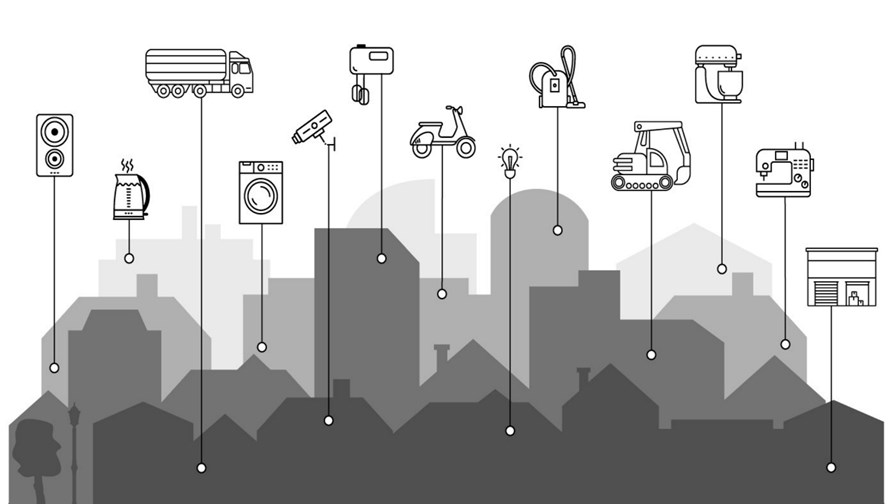
via Flickr © medithIT (CC BY 2.0)
- That old city-wide IoT network idea, where technology is tasked to hoover up city data, is still live
- The task is to build a city’s ‘digital twin’ - a “mosaic of street-by-street, minute-by-minute information” - and derive valuable insights
- Cambridge, UK is building one, starting next month
That old 50 billion devices projection for IoT deployment looks quaintly optimistic now. The industry that seemed on the verge of catalysing nearly a decade ago now has involved a much slower burn than expected. In fact it’s hardly been a burn at all, more a smoulder.
And yet it all seemed so inevitable just a few years ago.
The bright future was built on the idea of low cost sensors - millions and billions of them. The more you built, the cheaper they got.
What if they could be connected by an equally low-cost network scheme?
Add in increasingly powerful data analytics and you surely had a recipe for a new industry which could collect and share data, cross reference it from one application to another and build real value back into the digital economy.
Why hasn’t it turned out that way already?
“I think the task was just much tougher than expected,” says Professor William Webb who has been a long-time IoT standards exponent and industry observer.
“We made a mistake, me included, in thinking IoT was all about networking. When in fact it was about applications,” he says.
Even the standardised NB-IoT (which William was involved in pre-Huawei) has so far been a bit of a damp squib. Not much in the way of jolly hockey stick growth curves there.
So what’s the way forward for telcos?
“I think it’s a mistake to take the view that IoT can be a telco and network driven business. Telcos need to talk to integrators,” he says.
However. the original idea of building standard IoT networks and applications that could then exchange data to surface surprising and highly valuable behavioural insights on families, cities, farms and so on, is still one worth chasing, despite (or perhaps because) the world now worries about data collection and privacy protection much more than it used to.
The answer, it’s generally agreed, is to prove that the data is being collected and used for the right reasons - for the citizens’ benefit, not as a way of squeezing more money out of them.
To that end, this week smart street lighting specialist, Cambridge, UK-based Telensa, announced an ‘Urban Data Project’.
It has built a solution powered by the Microsoft Azure cloud platform that creates a ‘trust infrastructure’ (important wordage for our privacy-conscious age) for urban data.
“One that enables cities to collect, protect and use their data for the benefit of all citizens,” explains Telensa whose first deployment will be in its Cambridge UK home town.
Telensa’s pitch is: “Urban data is the mosaic of street-by-street, minute-by-minute information that makes up a city’s digital twin. It includes mapping how people use the city, the mix of traffic on the roads, the hyper-local air quality and noise levels. This data is incredibly valuable for designing better city infrastructure, delivering more efficient city services, and making everything more transparent to empower citizens. It is also potentially valuable to industries such as retail, real estate and insurance.”
Telensa claims that the use of urban data has been limited by two barriers. The first is the cost of single-purpose sensors and the related cost of moving video data to the cloud. The second has been one of trust – how can a city’s Chief Data Officer apply best-practice policies to the data, and provide transparency to citizens on how that data is protected and used?
There are two key technology elements to the Urban Data Project:
Data is collected by Telensa Multi-Sensor Pods, using its proprietary network technology, installed on streetlight poles, with sensors including video and radar feeding into a powerful edge compute platform. The pods run on Microsoft Azure IoT Edge and feature real-time AI and machine learning to extract insights from the raw data.
Data from the pods is combined with other city data in the City Data Guardian. This is the trust platform, built on Microsoft Azure, that enables cities to apply privacy policies, comply with data regulations, and make data available to improve services and drive future city revenues.
Following intensive product development during 2018, the first deployment is scheduled to take place in Cambridge in March, the company says.
Email Newsletters
Sign up to receive TelecomTV's top news and videos, plus exclusive subscriber-only content direct to your inbox.




